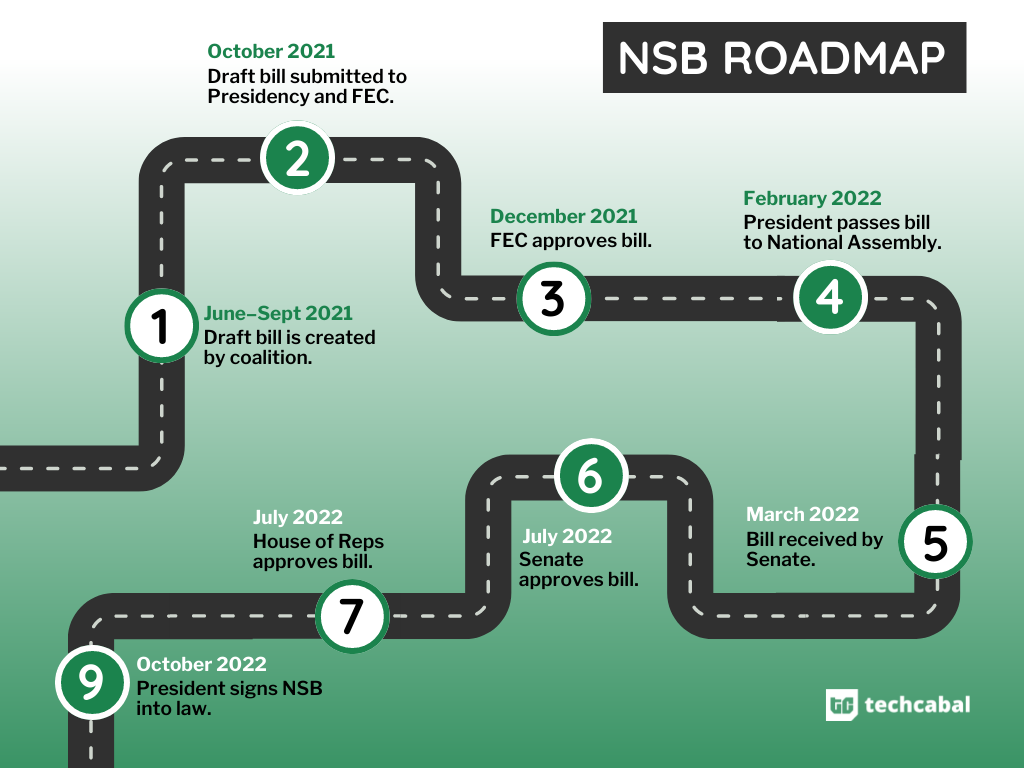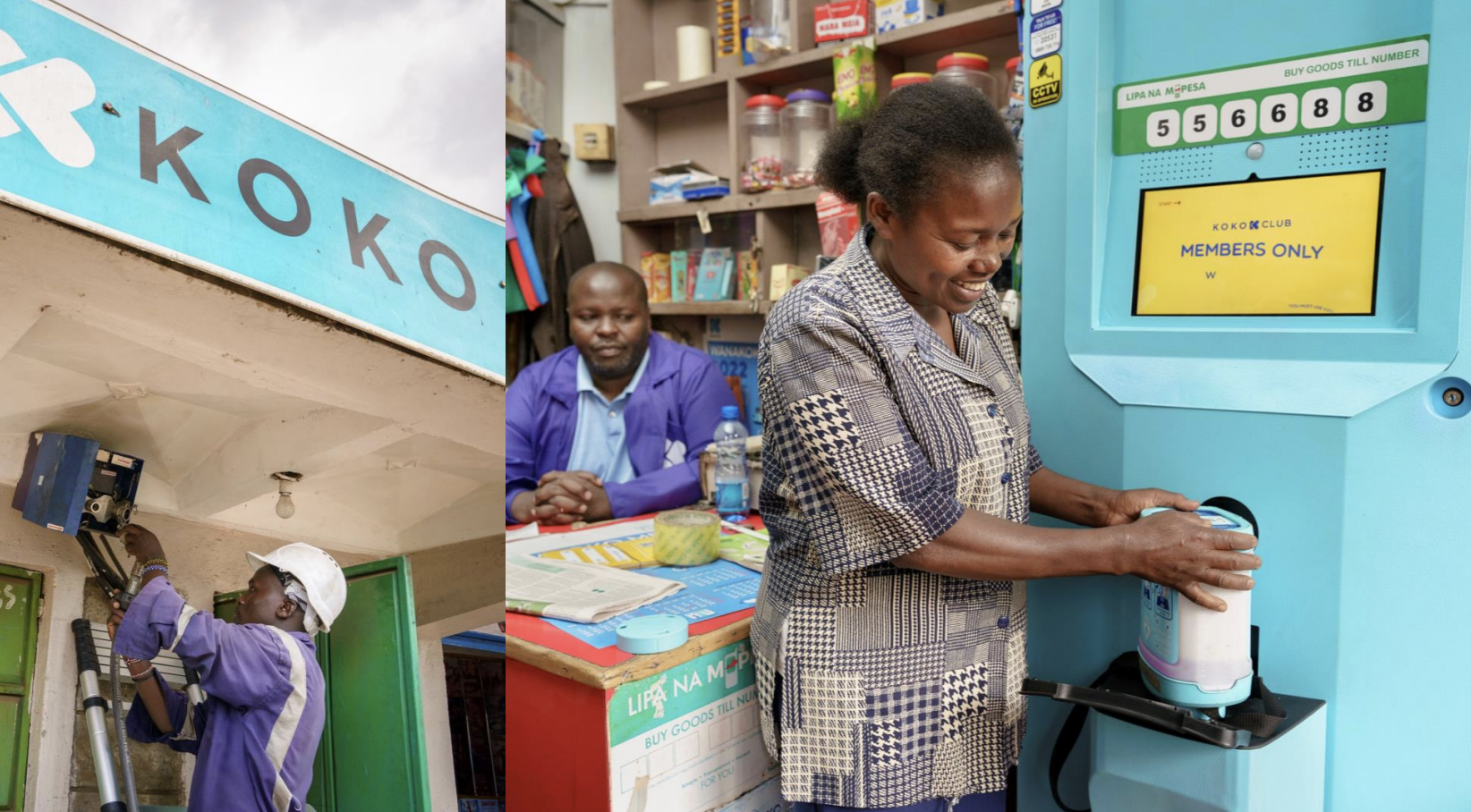
IN PARTNERSHIP WITH

Happy pre-Friday 🌞
What’s the first thing that pops in your mind when you hear the phrase “the cloud”?
Rain? Tax? Or other inevitable stuff? For many techies, they’re thinking of the network of computers that can only be accessed via the internet. The cloud is where many popular social apps like TikTok, Netflix and even Twitter store and host their services.
In this week’s edition of #EnteringTech🚀, we take a look into the lives of the people who build and maintain the cloud, and we tell you how you can be like them too!
CRYPTO MARKET: SOUTH AFRICA RECOGNISES CRYPTO

|

|

|
|---|---|---|
|
Bitcoin 
|
$19,158 |
– 0.70% |
|
Ether 
|
$1,288 |
– 1.23% |
|
BNB 
|
$272 |
– 0.10% |
|
Solana 
|
$29.07 |
– 3.15% |
|
Cardano 
|
$0.35 |
– 1.17% |
|
|
Source: CoinMarketCap
|
|
* Data as of 05:30 AM WAT, October 20, 2022.
South Africa’s Financial Sector Conduct Authority has announced that crypto assets in the country will be treated as financial products.
According to a gazette published by the authority, crypto assets are “a digital representation of value” that can be traded, transferred or stored electronically for purposes of payment, investment or other forms of utility.
Why is this important? South Africa has been at the centre of some of the world’s biggest crypto scams. In July, the US Commodities Futures Trading Commission (CFTC) charged a South African resident in the largest fraud scheme involving bitcoin, a scheme worth $1.7 billion. In June 2021, founders of crypto startup AfriCrypt vanished after running a $3.6 billion crypto scam.
Many commercial banks in South Africa cut off crypto service providers earlier in the year, but they were urged by the South Africa Reserve Bank (SARB)’s Prudential Authority to accept crypto.
The pronouncement means all legal and financial opportunities and remedies available to financial products in South Africa will be afforded to crypto too.
Don’t just send money, send money fast. Send and receive money directly to mobile wallets, bank accounts, Barter or through cash pickup with $end.
Visit send.flutterwave.com and do it now!
This is partner content.
NIGERIA PASSES STARTUP BILL
There is a new law in town and it could mean success for Nigeria’s tech ecosystem.
Yesterday, Nigeria’s minister for communications and digital economy, Isa Pantami, announced that the Nigeria Startup Bill had been signed into law.
ICYMI: Since October 2021, stakeholders in Nigeria’s tech ecosystem have been working with several governmental parastatals to pass a bill—the Nigeria Startup Bill (NSB)—that provides an enabling environment for tech startups in Nigeria.

In the last two years, Nigeria has made regulatory changes that have stopped some startups in their tracks– like this 2020 state regulation that banned bike-hailing startups in Lagos, Nigeria’s most populous city.
With the Nigeria Startup Bill—now the Nigeria Startup Act—the gap between startups and regulators will be bridged. The Act will make tax break provisions for new startups. It will also provide tax incentives for foreign service providers. It also delineates requirements for registration and licensing or labelling of startups.
A draft bill was first submitted to the Presidency and the Federal Executive Council (FEC).
Zoom out: The NSB might be law in Nigeria, but there is still much work to be done before it’s the apex law guiding Nigeria’s tech ecosystem. Presently, the Federal Executive Council (FEC) is still toying around with a new NITDA Act that contradicts the NSB. For example, while the NSB will give tech startups tax breaks, the NITDA Act heavily taxes startups. This approval is only one battle won in the regulatory war for Nigeria’s tech ecosystem.
MTN WALKS AWAY FROM TELKOM MERGER DEAL

Looks like MTN wants to be everywhere you go—except in an open relationship.
What’s up?
Yesterday, MTN and Telkom jointly announced to shareholders that talks of a merger between both parties have been terminated.
This news comes a few days after Bloomberg reported that merger talks between the two telcos had stalled because of Rain’s recent offer.
JSYK: The fight for Telkom South Africa’s hand in merger has been on since July when MTN announced its plan to buy Telkom to become the leading telco, beating forerunner Vodacom. Since then, other suitors like Toto Consortium are working to woo Telkom into entering a merger. The most relentless suitor is Rain whose initial proposal was rebuffed in August by regulators who said it had no permission to propose a merger. Rain retreated for a while but returned in September with appropriate permissions, and a formal proposal.
Since then, MTN has been trying to lock Telkom down. Days after Rain’s official proposal, MTN—in the fashion of every love-struck entity—sent a letter to Rain in a bid to confirm its plans.
And now?
The deal is off because MTN doesn’t like to share.
According to Telkom, “MTN terminated discussions in relation to the MTN proposal on 18 October 2022, as Telkom was not in a position to provide MTN with assurances around exclusivity. Discussions were at an early stage and had not progressed to due diligence, nor had a binding offer been received by the Telkom board of directors.”
Following the news of losing its most attractive suitor, Telkom’s stock tanked by 25%.
Increase your online sales with a Paystack Storefront – a free, beautiful seller page that helps you bring creative ideas to life.
👉🏾 Learn more at paystack.com/storefront.
This is partner content.
GHANIAN SMES ARE PROTESTING A 37% INFLATION RATE

Since Russia and Ukraine entered the wrestling ring in February, the world has not been the same and inflation has become a global problem.
But in some countries like Ghana, the Russo-Ukrainian crisis only increased already-existing problems. Ghana has long been battling with inflation, with rates that have increased monthly for 16 straight months, up to a recent 21-year high of 37.2%.
With these rates, the cedi is described as the world’s worst performer against the dollar. Living in Ghana has become increasingly expensive—too expensive for the traders to do nothing about it.
So, they’re going on a three-day protest.
Locking businesses, raising placards
According to Quartz, Ghanaian traders, under the Ghanaian Union of Traders Association have unanimously taken to the streets of Ghana to express their deep pains about the country’s economic situation.
With their shops locked, these demonstrators are trying to make the government respond to their plight: inflation, high-interest rates, and a failing cedi has put many businesses on the brink of bankruptcy.
“As I speak to you now, we are not able to service our loans contracted by local banks and external suppliers. We are now at our wit’s end and can no longer endure any further suffering,” Joseph Obeng, the union’s leader said.
Ghana’s light at the end of the tunnel
Ghana is looking for a bailout in a $3 billion relief fund from the International Monetary Fund (IMF), with which the country hopes to turn the tides. But the IMF is not convinced yet, and is asking Ghana to flesh out an economic reform plan.
Will protests like this convince the government to act with urgency? We’ll have to wait and see.
NETFLIX REGAINS LOST SUBSCRIBERS

In April, Netflix reported its first subscriber decline in 10 years. The news broke out sending Netflix’s stock value crashing by $50 billion. Two quarters later, the streaming company turned the tide by adding over 2.4 million subscribers to the platform. The total number of Netflix subscribers now stands at 223 million.
Why did it lose so many subscribers?
Netflix lost 200,000 subscribers in the first quarter, and 970,000 in the second. It said that the loss can be blamed on the following reasons: subscribers spending less time on digital entertainment platforms due to eased COVID restrictions, increased competition from other video streamers such as Disney, HBO, Prime, etc, and password sharing with friends and family which 100 million households are doing.
The turnaround
Netflix gained 2.4 million subscribers—more than double what it lost in the previous quarters—$7.9 billion in revenue and about $1.4 billion in profit. The company didn’t say what it did to turn the tide but we know that in the past months it laid off 450 employees, reined in its expenses and put out high-performing video content like “Monster: The Jeffrey Dahmer Story”; the romantic drama “Purple Hearts”; and “Stranger Things,” in the last quarter.
The Netflix company has announced its plans for further growth. It will crack down on password sharing and limit the access non-subscribers have to Netflix.
It will also introduce an ad-supported lower-cost subscription in November to attract more subscribers. The ad-supported tier will show subscribers four to five minutes of ads per hour of streaming.
Protect your hard-earned money from inflation by saving in dollars on Pillow Fund.
Pillow is Nigeria’s #1 savings app that lets you save in dollars and earn 14% interest on it. Download the app, use TCPILLOW signup code to get ₦700 bonus on first deposit.
This is partner content.
SAFARICOM CALLS CEOS TO COMMIT TO SUSTAINABILITY

Network provider Safaricom has made a clarion call.
Safaricom’s CEO Peter Ndegwa has called on Kenyan CEOs to be active members of the Africa Business Leaders Coalition (ABLC). ABLC encourages collaborative solutions to sustainability issues like climate change and promotes the incorporation of UN Global Compact principles in supply chains and the broader ecosystem in Africa.
Leading by example
Safaricom, a founding member of the ABLC, says it has been leading by example. The company reports that it has sustained over 214,000 direct and indirect jobs while delivering a wide range of products, services and initiatives that support businesses, and communities. Safaricom says that it has also created awareness of and offered long and short-term support to communities hit by prolonged drought—a dire impact of climate change. It has offered palliatives, training and equipment for farmers with the necessary knowledge and tools.
The company has called on businesses on the continent to begin or double down on their sustainability efforts for the good of the continent at large.
IN OTHER NEWS FROM TECHCABAL
Meta’s recent event in Lagos highlights the role of African creators in building the Metaverse.
Egyptian B2B e-commerce startup, MaxAB, raises $40 million pre-Series B to fuel its expansion across the MENAP region.
My Life in Tech: The Meta boss passionate about restoring trust in African e-commerce.
QoreID offers a new way to carry out verifications using digital identity solutions customised to meet your KYC and compliance needs. The company offers a robust digital identity infrastructure that includes last-mile verifications, consumer insights, fraud prevention engine/tools, financial data analytics, instant identity verification, and much more. Learn more at QoreID.com
This is partner content.
OPPORTUNITIES
- Telecel Group’s African Startup Initiative Program is now open for applications. The 10 selected startups will receive €15,000 in cash each and benefits valued at more than €500,000, including credits from AWS, Google Cloud Services, Hubspot, and more. Apply by November 11.
- Applications are now open for Apple’s Entrepreneur Camp. The immersive virtual camp will give founders and developers from underrepresented communities mentorship, technical support and access to the alumni network. Apply by December 5.
- The Next Einstein Forum is receiving applications for its new cohort of NEF Ambassadors (2022-2024). The ideal candidates are young Africans who are champions of Science, Technology, Engineering and Mathematics (STEM), and Social Sciences in their respective countries. Apply by October 24.
- If you have a business in the agricultural sector, apply to the African Development Bank’s AgriPitch competition—a 2-week virtual program—-to get business mentorship and win access to a grant pool of $140,000. Apply by November 4.
- Applications are open for the Association of Commonwealth Universities Emerging Career Conference Grants. There are about 25-40 grants available to emerging researchers and university teachers who need funding to attend virtual or physical conferences. Apply by November 28.
- African Research Leaders 2023 is calling for funding applications from African medical researchers who have completed a PhD and need the support of £750,000 over the course of five years. Apply by December 1.
What else is happening in tech?
- Safaricom hit as a third of its small business clients flee from “expensive services and lack of transparency.”
- Apple launches redesigned iPad with a bigger screen and USB-C port.
- Netflix is doing it and now, Uber is too. The global ride-hailing company wants to boost digital ad revenue with a new advertising division.
- Level Up: How Dalu Akabogu turned a tough break into a series of big breaks.































